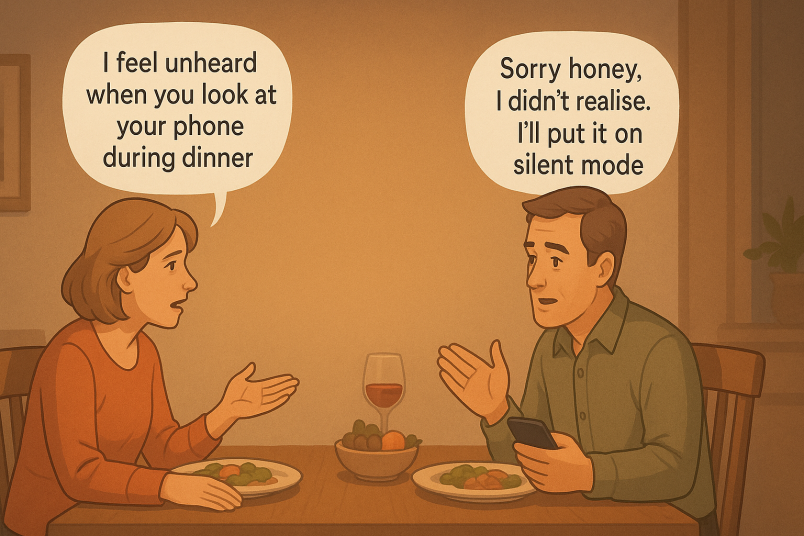What Are “I” Statements in Relationships? Benefits & How to Use

Heal & Grow Daily for a Happier Relationship
Subscribe FREEKey Takeaways
Marriage.com AI Quick Summary
“You never listen to me!”… sound familiar? Maybe it’s after a long day, when dishes are still in the sink, or when your partner forgets something important. Suddenly, frustration spills out, and both of you feel unheard.
Arguments often take this sharp turn—one person points a finger, the other gets defensive, and the cycle repeats. But what if shifting just a few words could soften the moment?
That’s where I statements in relationships quietly step in; instead of blame, they highlight feelings. A small tweak in language can change everything—turning heated exchanges into moments of genuine understanding.
What are “I” statements in a relationship?
I statements in relationships are a simple yet powerful way of expressing your feelings without blaming the other person. Instead of saying “You never help me,” you shift the focus to yourself: “I feel overwhelmed when chores pile up.” This gentle reframe reduces defensiveness and opens space for healthier communication.
According to Jennifer Jacobsen Schulz, LCSW:
Using an “I” statement can make it easier to communicate about difficult topics because taking ownership of your feelings will make the other person less defensive.
A research paper published in 2018 states that using I-language alongside acknowledging the other person’s perspective—such as saying I understand you feel that way, but I feel this way...—helps reduce defensiveness and hostility at the start of conflict discussions.
Please note:
Remember, communication is a skill, not a test. If it feels awkward at first, that’s okay—using I statements in relationships takes practice. With time, using I statements in relationships can become second nature, helping you feel more heard and more connected.
7 examples of “I” statements in a relationship
Everyday moments in relationships often carry hidden tension. That’s where I statements step in. Instead of accusing or blaming, they gently shift the focus to your feelings and needs. Below are practical scenarios showing how to use them, with simple examples, and how each one helps nurture understanding.
1. When you feel unheard
It’s painful when you’re sharing something important and your partner seems distracted or dismissive. Feeling unheard can quickly turn into frustration if it isn’t voiced kindly.
- What you can say: “I feel hurt when you don’t listen to me.”
- How it helps: It shows your emotional need without blaming, making your partner more likely to respond with empathy
2. When you need space
Sometimes, the best way to recharge isn’t togetherness but a little time alone. Asking for space clearly can prevent unnecessary conflict or misinterpretation.
- What you can say: “I need some time alone to recharge.”
- How it helps: It prevents misunderstandings and reassures your partner that your need for space isn’t rejection, but self-care.
3. When chores feel unbalanced
Household responsibilities can quickly become a source of resentment if one person feels overburdened.
Research Highlight: A research paper published in Socius states that men increased housework and childcare, and effective partner communication strongly influenced equality at home and overall relationship satisfaction for both partners.
Addressing it openly keeps things fair and balanced.
- What you can say: “I would like to have a more equal share of household chores.”
- How it helps: It opens a conversation about teamwork rather than criticism, helping build fairness and partnership at home.
4. When voices get raised
Raised voices often trigger anxiety or defensiveness, making it harder to resolve the actual issue. Naming this calmly can shift the energy of the conversation.
- What you can say: “I feel anxious when you raise your voice.”
- How it helps: It shifts focus to your feelings, encouraging your partner to lower their tone and create a calmer space for discussion.
5. When you’re struggling emotionally
During tough times, unspoken needs for support can leave you feeling isolated. Asking for what you need gives your partner a chance to be there for you.
- What you can say: “I need your support when I’m going through a difficult time.”
- How it helps: It communicates vulnerability directly, giving your partner a clear way to show love and support.
6. When plans aren’t clear
Uncertainty about plans can cause stress or miscommunication. Asking for clarity keeps both of you on the same page and avoids unnecessary frustration.
- What you can say: “I would appreciate it if you could communicate your plans with me in advance.”
- How it helps: It reduces stress and uncertainty, creating mutual respect and smoother coordination.
7. When you feel unappreciated
It’s easy to feel taken for granted when your efforts go unnoticed. Expressing this need gently can invite more gratitude and recognition into the relationship.
- What you can say: “I feel unappreciated when my efforts go unnoticed, and I’d love a little acknowledgment.”
- How it helps: It encourages your partner to show appreciation, strengthening mutual respect and emotional closeness.
What are the benefits of using “I” statements in relationships
When it comes to relationships, the way we phrase our feelings makes a huge difference. “I” statements shift the focus from blame to honesty, helping couples feel safer, calmer, and more understood. Below are some meaningful benefits that show why this approach truly works.
1. They reduce defensiveness
When you start a sentence with “You always” or “You never,” your partner is likely to feel attacked.
Jenni Schulz highlights that:
When you use an “I” statement, the other person is less likely to feel attacked, which leads to a better discussion.
That defensiveness can shut down the whole conversation. “I” statements, on the other hand, soften the tone by focusing on your feelings. This makes your partner more open and willing to listen.
2. They build emotional safety
Healthy relationships need trust and a sense of safety. By expressing yourself with an “I” statement, you’re showing vulnerability rather than accusation. This makes the other person feel less pressured and more comfortable responding. Over time, this practice helps both partners create a safe emotional space.
3. They make communication clearer
I statements in relationships cut through confusion by explaining both what you feel and why. For example, saying “I feel left out when you make plans without me” gives clarity that “You don’t care about me” does not. Clear communication prevents misunderstandings and strengthens the connection between partners.
4. They encourage responsibility for feelings
Using “I” statements reminds you to take ownership of your emotions rather than blaming someone else for them. This doesn’t mean ignoring your needs—it means expressing them with honesty. Taking responsibility in this way shows maturity and helps your partner respond with care instead of resistance.
5. They create healthier problem-solving
When emotions are expressed without blame, the conversation becomes about solving the problem instead of fighting each other. Couples can focus on what needs to change rather than who’s at fault. This shift turns arguments into teamwork and makes solutions feel more balanced and fair.
How to use “I” statements in relationships correctly: 7 easy steps
1. Begin your statement with “I feel,” “I need,” or “I would like.”
Starting this way sets the tone that you’re sharing your perspective, not pointing fingers.
It immediately makes the conversation feel less like an attack and more like a personal truth. This keeps both partners on the same side of the problem rather than in conflict.
- Pro tip: Try: “I feel anxious when plans change suddenly,” instead of “You always mess up our plans.”
2. Focus on your own thoughts, feelings, and needs rather than blaming or accusing the other person.
Keeping the spotlight on yourself shows responsibility for your emotions and prevents your partner from getting defensive. It creates room for empathy instead of hostility. This is one of the biggest strengths of I statements in relationships—they gently invite understanding.
- Pro tip: Replace “You never listen” with “I feel unheard when I’m interrupted.”
3. Avoid using generalizations or exaggerations.
Phrases like “always” or “never” tend to escalate arguments because they feel unfair. Instead, zero in on a specific situation. This makes your partner more likely to respond positively, since the issue feels manageable rather than overwhelming.
- Pro tip: Focus on “last night’s conversation” instead of saying “You never pay attention to me.”
4. Be clear and concise in your message.
The goal isn’t to deliver a speech but to state your feelings in a way that’s easy to understand. Short, direct sentences have the most impact. Over-explaining or rambling can dilute your message and make it harder for your partner to grasp your needs.
- Pro tip: Keep your statement within one or two sentences, like the best examples of I statements in relationships.
5. Listen actively and respond respectfully to the other person’s perspective.
Communication is a two-way street. Once you’ve expressed yourself, it’s important to really listen to your partner’s side. Respectful listening not only validates their feelings but also encourages cooperation in finding solutions that work for both of you.
- Pro tip: Nodding, repeating back what you heard, and maintaining a calm tone all show active listening.
Watch this TED Talk by Dr. Julie Schwartz Gottman, clinical psychologist, who shares techniques for expressing complaints gently—using a softened startup to prevent criticism and preserve connection.
6. Use “I” statements consistently to promote positive communication and understanding in your relationships.
Like any new habit, this takes practice. The more you use “I” statements, the more natural they become. Over time, this shift can transform conflict into connection, turning even difficult conversations into chances to grow together. Practicing daily is how using “I” statements in relationships becomes second nature.
- Pro tip: Start small—use “I” statements in everyday situations like chores or planning before applying them to bigger conflicts.
7. Choose the right timing
Even the best “I” statement can backfire if said in the heat of anger. Timing matters—wait until both of you are calm and willing to talk. This ensures your words are received thoughtfully instead of defensively.
- Pro tip: If emotions are running high, take a short break and return to the conversation when you both feel steady.
FAQ
It’s natural to have questions when learning something new—especially with communication tools that feel different from what you’re used to. Here are some quick answers to help clear things up.
-
Do “I” statements really work in relationships?
Yes. They reduce defensiveness, improve clarity, and create emotional safety. Couples who practice them often find that conflicts become calmer and easier to resolve.
-
Can I use “I” statements outside of romantic relationships?
Absolutely. They work in friendships, family conversations, and even at work—anywhere clear and respectful communication matters.
-
What if my partner doesn’t respond well to “I” statements?
Stay consistent. It may take time for your partner to adjust, but modeling healthy communication often encourages them to follow your lead.
The power of words
At the heart of every strong relationship is communication that feels safe, honest, and respectful. “I” statements offer a simple way to share your feelings without blame, helping both partners feel seen and understood. While it may feel awkward at first, practice turns this skill into second nature.
Remember, it’s not about being perfect—it’s about creating space for connection and growth. Small changes in how you speak can bring big changes in how you relate, one conversation at a time.
 Tips
Tips
Write your tip or submit a video tip
All tips are reviewed before the publishing.
Share this article on
Related Articles
Recent Articles
Related Quizzes
Heal & Grow Daily for a Happier, Healthier Relationship
Subscribe FREE on YouTube We'd love your feedback!
We'd love your feedback!
 Expert Q&A
Expert Q&A
Ask your question related to this topic & get the support you deserve from experts.





















 Thanks for your feedback!
Thanks for your feedback!